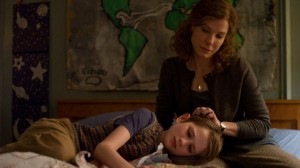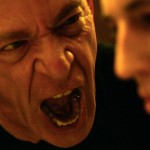 In the ten years since the terrorist attacks of September 11, 2001, the country has debated their meaning and the appropriate reaction to them, but Hollywood has been largely silent. An event so big takes time to digest. Other than fact-based recreation of events like “Flight 93” and “World Trade Center,” movies have not yet wrestled with the attacks or their impact on the soul of our country.
In the ten years since the terrorist attacks of September 11, 2001, the country has debated their meaning and the appropriate reaction to them, but Hollywood has been largely silent. An event so big takes time to digest. Other than fact-based recreation of events like “Flight 93” and “World Trade Center,” movies have not yet wrestled with the attacks or their impact on the soul of our country.
Enter “Extremely Loud & Incredibly Close,” an ambitious and far-reaching attempt to find mysticism and meaning in the aftermath of the devastation of the World Trade Center. It’s a noble ambition, but the quirky nature, unbelievable realism, and basic unlikeablility of the main character keep the movie from meeting its lofty goals. It also suffers from a basic misunderstanding of human nature.
This is not the 9/11 movie we’ve been waiting for.
Thomas Horn plays Oskar Schell, a preteen boy who had problems even before the collapse of the twin towers took his father. Possibly Asperger’s, but definitely nervous and anti-social, the child idolized and adored his father (Tom Hanks). In an attempt to get him to interact with the world, his father sent him on whimsical quests. When the attacks intervened, he had set his son on a mission to find the missing sixth borough of New York City.
A year later, Oskar and his mother (Sandra Bullock) begin to emerge from the fog of grief. Oskar finds a key hidden in his father’s belongings. Believing it to be a clue that will lead to some sort of reconnection with his father, he begins a quest to find its lock. The journey takes him all over New York and into the homes of strangers who are also affected by the attack on the city. Oskar is joined in his travels, occasionally, by his grandmother’s mysterious renter, an old man who does not speak (Max von Sydow, our interview here.)
One primary flaw of the film is the discomfort felt when the characters do something, supposedly in real life, that would be very, very dangerous in reality. Oskar is shown traveling New York by himself and knocking on strangers’ doors, barging into whatever life situation in which they currently find themselves. His first meeting is with Abby Black (Viola Davis), whose husband is in the very act of moving out. The mystic in you wants to believe a little boy could travel the city and meet these people in a kind of spiritual quest, but the mother inside all of us knows it’s extremely dangerous and incredibly stupid, so it creates an unpleasant tension while watching the film.
Despite all the characters Oskar meets, their backstories are only hinted. The movie could have been much richer with less of Oskar’s neuroses and more of ordinary New Yorkers experiences.
The mute neighbor suffers from the same problem. He’s not quite mystical enough to be magical, but too odd to be real. I have never met someone too traumatized to speak for decades, nor have I known anyone who has. It’s a wonderful device for a story, but you have to work hard to suspend your disbelief.
Finally, Oskar himself is drawn as marginalized, but quickly moves to irritating. He is downright cruel to his mother, something that even a hurting boy of his age should realize. Eric Roth, the writer of “Forrest Gump” also wrote this screenplay and he’s presumably looking for the same triumph of the usually despised among us over their “normal” counterparts. Oskar doesn’t come off as triumphant, however, so much as in need of some discipline and extremely irritating.
That is not to say the film doesn’t have its moments. Most poignant is the final revelation of the weight of Oskar’s guilt he has been unnecessarily carrying since his father died. As the towers crumble, so does Oskar, and it’s a moment that will remain in your mind.
Ultimately, however, the movie pulls its punches too much. Oskar, in his odd quest, is trying to make sense of a terrible act. It’s futile because in the context of the movie, nothing is bad, only nonsensical. You’re looking for an answer, his mother tells him, but you can’t make sense of it because it doesn’t make sense.
Evil is not a word that is used. There is no understanding the terrorists of 9/11 because to do so would to be to admit the existence of evil. Furthermore, no one is angry in this world, just sad. No one Oskar meets wants vengeance or justice. No one treats him badly, either. The world is good and deviation from that good, as in the attacks, just doesn’t make sense. It’s an unsatisfying answer for Oskar and an unsatisfying answer for the viewer.
Sadly, evil makes all too much sense. If there is one thing the attacks of 9/11 has taught us is that it can be extremely logical and incredibly determined. The terrorists had a mental framework that made perfect sense, twisted, but perfect. They spent years and their very lives in its service, and it is a framework that is still shared by others in the world. Only by recognizing that can we stop it.
Otherwise, we’re just on a wild goose chase with Oskar.












